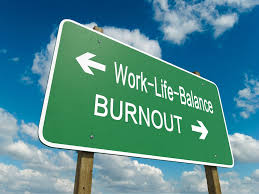
Heidi DiGennaro
Alice asked the Cheshire Cat, who was sitting in a tree, “What road do I take?”
The cat asked, “Where do you want to go?”
“I don’t know,” Alice answered.
“Then,” said the cat, “it really doesn’t matter, does it?”
— Lewis Carroll, Alice's Adventures in Wonderland
The road you want to take is the one that will keep you (mostly) sane and healthy at the end of your journey. Without direction, you will trudge through each day like a march to your last day.
Now’s when you take care of yourself before the cumulative effects start or become entrenched. Too often we take on the stress of an incident gone wrong even if we had little to nothing to do with the outcome. Or we berate ourselves for mistakes. Five years later, we’re still bitter about that mistake. Is this healthy for us? No.
I’ve received several pieces of advice on how to handle a work/life balance. Use them or lose them at your discretion.
- If you think you know everything, quit. You don’t. Always be open to learning something new. In this technology age, programs change faster than their operators, and we are forced to adapt. Just because we do something the same way for years doesn’t mean it won’t change. Keeping an open mind will help you learn shortcuts, too. I recently taught a five-year plus veteran a time-saving trick she never knew.
- The 30-minute rule. You get 30 minutes total—it doesn’t have to be consecutive—to vent about your day. Get rid of the stress even if you’re talking to the furry family member. After 30 minutes, you can’t talk about work until after the next shift so you can focus on life outside the dispatch center.
- Is it worth your health? Is what you are worked up about that is raising your blood pressure, heart rate, etc., worth the physical cost? Will it matter in a year, two years, five years? Can you change whatever’s upset you? If you can’t change it, say your piece in the appropriate forum to the appropriate chain of command. If it’s not worth your health, don’t dwell on it. You’ve had your say, and your body will thank you.
- Sick leave usage. Stop and think about you before you come in sick. You are not at your best or even close, and you are setting yourself up to fail. You have a higher chance of making a mistake. You and your co-workers need your A game, not your C game. How much good are you if you’re passing along your germs and not doing a good job? Take the time for yourself, and don’t share germs with everyone.
- This includes mental health days when your body is OK but your head or emotions are not. Your emotions are contagious—bad emotions spread with the speed of a plague. If you can do it, take the time. Am I suggesting for you to get in trouble because you don’t have leave? No, this isn’t a permission slip. It’s a prompt to stop and think about how effective you are going to be.
- Find one positive thing each day. Look for something positive every day. Even in the midst of crisis, you can find one positive thing. Maybe the incident isn’t as bad as it could be. Maybe one person made you smile. Build on those moments.
Your mental health is as important as your physical health. Invest in yourself. Sometimes that one day off or that open mind can be the difference between enjoying your job and surviving it. You want a long retirement; you’ve worked for it. Neglecting your mental and physical health can shorten that retirement. So find a direction, know where you are going, and go forth and stress no more!









